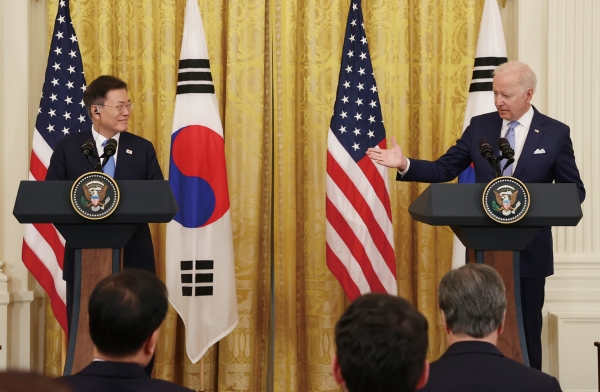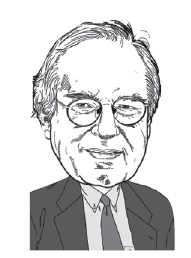문재인 대통령이 피하고 싶은 주제가 있다면 그것은 중국이나 북한의 인권 문제일 것이다. 문 대통령이 그의 경력 대부분이 한국의 인권을 대변하는 열렬한 운동가였다는 것을 고려하면 이는 불행한 일이다.
독재자 박정희 정권 당시 1972년 제정된 유신헌법 반대로 투옥된 그는 44년 후 촛불시위에서 인권을 핵심 문제로 내세워 그의 딸인 박근혜 전 대통령을 탄핵하고 투옥 시켰다.
그러나 한국에 가장 큰 위협이 되는 두 공산국가를 상대할 때 문 대통령은 두 공산주의 국가의 엄청난 인권 유린에 대해 말하기를 꺼린다. 지난 5월 백악관 정상회담 이후 바이든 미 대통령의 이름과 자신의 이름으로 발표한 공동성명에 인권에 대한 막연한 일반론에 매우 조심스럽게 자신의 이름을 올렸다.
‘대만해협 평화와 안정 보전의 중요성’을 강조한 직후 성명을 통해 “다원주의와 개인의 자유를 중시하는 민주주의 국가로서 국내외적으로 인권과 법치 문제를 증진하겠다는 뜻을 공유하고 있다”고 밝혔다.
대만에 대한 이러한 암시는 문 대통령이 대통령 재임 기간 동안 처음으로 중국을 불쾌하게 할 수 있었던 것이었다. 정의용 외교부 장관은 대만 언급에 대한 중국 측의 항의에 대해 “중국의 이름은 결코 사용되지 않았다”고 재빨리 응답했다.
그러나 중국은 대만 방어에 미국과의 협력의 어떠한 징후도 언젠가는 대만이 중국의 한 지방으로 회복될 것이라는 공언에 심각한 간섭으로 보고 있다. 대만에서 무슨 일이 일어나든 북경은 종종 “내정”이라고 언급해왔으며 대만 문제에 바이든 대통령과 입장을 함께 한 문 대통령은 위험한 행동을 한 것이라는 입장이다.

북·중 인권 유린에 언급을 꺼리는 문 대통령
문 대통령은 그 경고를 매우 심각하게 받아들이고 있다는 것에 의심의 여지가 없다. 최근 160킬로미터 폭의 대만해협 본토에 중국의 군비 증강 징후가 포착돼 중국 군대가 모택동의 홍군 승리와 1949년 중화인민공화국의 출현으로 장개석 군대가 후퇴한 섬을 회복하기 위한 군사행동을 고려하고 있는 것 아니냐는 관측이 나오고 있다.
대만을 되찾기 위한 중국 군사작전은 교황청 외에 13개 적은 국가만이 중화민국으로 인식하고 있음에도 미국이 독립국가로 활동하는 대만의 방어를 고려할 때 어려울 것으로 보인다. 그럼에도 미국이 주변국 곳곳에서 중국의 부상에 대한 경각심을 드러내면서 대만은 물론 전 지역에 전쟁의 그림자가 드리워지고 있다.
자신과 북한 김정은의 대화 재개를 촉진하기를 간절히 바라는 문 대통령의 최선의 방법은 중국에 방해가 되지 않도록 하는 것이다. 바이든 대통령과 중국을 불편하게 할 성명서에 서명하는 것에 대한 그의 짧고 분명한 동의를 한 것을 제외하고 미국, 영국, 캐나다, 프랑스, 독일, 이탈리아, 일본 G7 정상들이 이달 영국 콘월에서 중국에 대한 비판을 가할 때 문 대통령은 불편한 듯 냉담했다.
그는 G7 회의에 참관인 자격으로 참석해 바이든 대통령과 담소를 나누고 스가 요시히데 일본 총리와의 짧은 만남을 가졌다. 남북한과 남북 모두에게 군사적으로나 경제적으로 그렇게 많은 권력을 행사하고 있는 나라를 더 이상 자극할 위험을 감수하지는 않을 것이 분명했다.
싱하이밍 주한 중국대사는 바이든 대통령과의 정상회담에서 문 대통령이 대만 언급을 묵인한 것에 대해 “주제가 언급되지 않았더라면 좋았을 것”이라고 비판하며 사실 상당히 자제했지만 왕이 중국 외교부장은 정의용 외교부 장관과의 후속 통화에서 엄포를 놓았다.
왕이 중국 외교부장은 “중국과 한국은 권리를 잘 알고, 올바른 입장을 고수하고, 정치적 합의를 준수하며, 결코 현혹되지 말아야 한다”고 말했다. 그는 비판의 폭을 넓히며 “미국이 제시한 인도·태평양 전략은 냉전 정신으로 가득 차 있고 지역 평화와 안정, 발전에 도움이 되지 않는 여러 집단 간의 대립을 부추긴다”고 경고했다.
문 대통령은 자신이 중국과 미국 사이에 다소 중립을 지키려고 노력하는 데 상당히 영리하다고 믿고 있다. 그는 한미동맹을 망치거나 미국의 요구에 굴복하지 않고 바이든 대통령과의 정상회담을 무사히 마친 것을 자랑스럽게 생각하는 것 같다. 그는 심지어 많은 논란이 일고 있는 서울에서 남쪽으로 305킬로미터 떨어진 곳에 미국이 설치한 사드 문제의 역경을 이겨냈다.
임기 중 어려운 선택은 피할 문 대통령의 ‘행운’
중국 내 한국 기업에 대한 보복과 함께 중국으로부터 항의의 외침이 줄어들었고 문 대통령은 결국 한국의 최대 교역 상대국으로 남아 있는 미국과 중국 모두와 잘 지낸 것을 자랑스럽게 여길 수 있다.
5년 임기중 1년도 채 남지 않은 문 대통령은 대만에 진짜 경고가 발생할 경우 어떻게 해야 할지에 대한 궁극적인 선택에 직면할 필요가 없을 것이다. 그는 한국이 대만을 방어하기 위해 주한미군의 배치 여부를 결정해야 할 때 퇴임하게 될 것이다. 또한 그는 한국군이 미국군을 지원해야 하는지에 대한 고통스러운 결정을 내릴 필요도 없을 것이다.
한반도에서 무력 충돌이 일어난다면 미국과 중국의 선택은 훨씬 더 어려워질 것이다. 확실히 한국과 미국은 끝까지 동맹국으로서 싸워야 할 것이다. 그렇다면 이 동맹국들이 한국전쟁 때처럼 북한에 뛰어들게 된다면? 그리고 만약 중국이 그 끔찍한 전쟁 때처럼 북한의 방어에 나선다면? 미래의 한국 대통령은 중국군과 북한군을 상대로 전쟁을 벌이거나 휴전에 동의하는 것 중 하나를 결정해야 할 것이다.
그렇다면 북한은 김일성이 71년 전 바로 6월 남침을 명령했을 때 꿈꿨던 것처럼 남한을 장악하게 될 것이다. 문 대통령은 먼훗날 북한과의 화해를 이룬 지도자가 아니라 미국과의 동맹을 배반하고 중국에 팔아넘긴 지도자로 역사에 남을 것이다.
번역 미래한국 편집부

If there’s one topic that President Moon Jae-in would like to avoid, it’s that of human rights issues in either China or North Korea. That’s unfortunate considering that Moon, for much of his career, has been an ardent crusader on behalf of human rights for South Korea. Jailed for his impassioned criticism of the Yushin constitution enacted under the dictator Park Chung-hee in 1972, he made human rights a central issue in the Candlelight Protest 44 years later that resulted in the impeachment and imprisonment of Park’s daughter, Park Geun-hye.
When it comes to dealing with the two Communist countries that pose the greatest threat to South Korea, however, Moon is reluctant to talk about egregious human rights abuses in either of them. It was with great care that he attached his name to vague generalities on human rights in the joint statement issued in his name and that of U.S. President Joe Biden after their White House summit in May. “As democracies that value pluralism and individual liberty, we share our intent to promote human rights and rule of law issues, both at home and abroad,” said the statement right after emphasizing “the importance of preserving peace and stability in the Taiwan Strait.”
That allusion to Taiwan was about the closest Moon has come to daring to offend China during his presidency. South Korea’s foreign minister, Chung Eui-yong, in response to the Chinese complaint about the mention of Taiwan, was quick to point out that China’s name was never used. China, however, views any indication of cooperation with the U.S. in the defense of Taiwan as gross interference in a province that it has vowed someday to recover. Whatever happens in Taiwan, Beijing has often noted, is “an internal affair.” Moon, by going along with Biden on Taiwan, was “playing with fire.”
Moon no doubt is taking that warning very seriously. Lately there have been signs of a Chinese arms buildup on the mainland side of the 160-kilometer-wide Taiwan Straits, hinting that China might be considering military action to recover the island province to which Generalissimo Chiang Kai-shek’s army retreated after the victory of Mao Zedong’s Red Army and the rise of the “People’s Republic of China” on the Chinese mainland in 1949. A Chinese military operation to recover Taiwan would appear unlikely considering the danger of the U.S. rushing to the defense of Taiwan, which functions as an independent nation even though only 13 small nations plus the Vatican recognize it as the “Republic of China.”
Nonetheless, as the U.S. expresses alarm about China’s rising power all around its periphery, the shadows of war are darkening over not only Taiwan but the entire region.
For Moon, hoping desperately for China to facilitate renewed dialog between himself and North Korea’s Kim Jong-un, the best response to the danger is to stay out of the way. Aside from his brief and no doubt reluctant assent to signing off with Biden on a statement that he knew would upset China, Moon himself remained uncomfortably aloof while the “Group of Seven” major powers, the U.S., Britain, Canada, France, Germany, Italy and Japan, crafted their criticism of China this month in Cornwall, England. He dropped by as an observer at the proceedings, chatting with President Biden and pausing for a brief encounter with Japan’s Prime Minister Yoshihide Suga, but he obviously was not going to risk further irritating the country that wields so much power militarily and economically over both Koreas, North and South.
China’s ambassador to South Korea, Xing Haiming, was actually quite restrained in criticizing Moon’s acquiescence to the mention of Taiwan at his summit with Biden, saying it would have been better if the topic had just not been mentioned, but China’s foreign minister, Wang Yi, was downright threatening in a subsequent telephone conversation with Foreign Minister Chung. China and Korea, said Wang, “should know well the rights and wrongs, stick to the correct position, abide by political consensus and never be misled.” Broadening his criticism, he warned, “The Indo-Pacific strategy proposed by the United States is full of cold war mentality and stirs up confrontation among different groups, which is not conducive to regional peace, stability and development.”
Moon no doubt believes he’s being quite clever in attempting to remain more or less neutral between Beijing and Washington. He appears proud to have gotten through his summit with Biden without either ruining the alliance or appearing to yield to American demands. He has even weathered the storm over THAAD, the Terminal High Altitude Area Defense system that the Americans have installed, amid much ongoing controversy, 305 kilometers south of Seoul. The outcries of protest from Beijing, along with retaliation against Korean business in China, have diminished, and Moon can be proud to have gotten along with both the U.S. and China, which after all remains by far the South’s biggest trading partner.
With less than a year to run in his five-year term, Moon will probably not have to face the ultimate do-or-die choice of what to do in case a real war breaks out over Taiwan. He will not be in office when South Korea has to decide whether U.S. forces based in the South should be deployed in defense of Taiwan. Nor will he have to make the agonizing decision of whether South Korean troops should support their American ally.
The choice between the U.S. and China will be much harder if armed conflict breaks out on the Korean peninsula. For sure South Korea and the U.S. would have to fight as allies to the end. What, then, if these allies were to plunge into North Korea, as they did during the Korean War? And what if China rose to North Korea’s defense as in those terrible war years? A future Korean president may well have to decide between waging war against Chinese and North Korean troops or agreeing to a truce.
The North Koreans would then gain power over South Korea just as regime founder Kim Il-sung had dreamed of doing when he ordered the invasion of the South 71 years ago this month. Moon would go down in history not as the leader who achieved reconciliation with the North, which is not going to happen any time soon, but as the leader who sold out to China while betraying the alliance with the U.S.
외부게재시 개인은 출처와 링크를 밝혀주시고, 언론사는 전문게재의 경우 본사와 협의 바랍니다.


